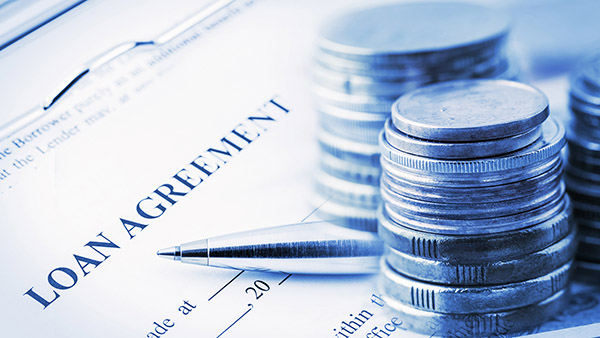Have you ever found yourself in need of a loan but were unsure which type to choose? Secured and unsecured loans are two of the most common types of consumer loans. While both offer advantages, they also come with disadvantages. In this article, we’ll discuss the key differences between secured and unsecured loans, their advantages and disadvantages, as well as the various types of each. So let’s get started!
Definition of Secured vs. Unsecured Loan
Secured loans are backed by collateral, while unsecured loans are not. Credit score and history are assessed for both types of loans. Secured loans have lower interest rates due to reduced risk. Longer repayment periods are common for secured loans. Unsecured loans are easier to obtain but have higher interest rates and shorter repayment periods.

Secured and unsecured loans have differences.
When it comes to obtaining a loan, there are two main types of loans available: secured and unsecured. Secured loans are backed by collateral such as a car or house, while unsecured loans do not require any form of collateral. Both types of loans have their pros and cons that should be considered carefully before making a decision.
The key differences between secured and unsecured loans include interest rates, repayment terms, and eligibility requirements. Secured loans usually come with lower interest rates than unsecured ones due to the lender’s reduced risk of repayment default. Additionally, secured loan repayment periods tend to be longer than those for unsecured loans. Finally, due to the presence of collateral in a secured loan, credit history is not as important when assessing an applicant’s eligibility for one. Unsecured loan eligibility depends more on an individual’s credit score and history since no form of collateral is required.
Understanding these differences is essential when considering which type of loan best meets your needs. Consider all the factors carefully before making your choice!
Advantages and Disadvantages of Secured vs. Unsecured Loans
Secured and unsecured loans are two types of financing that offer different advantages and disadvantages. Secured loans require collateral such as a house or car, while unsecured loans do not. The key differences between these two loan types include interest rates, repayment terms, and eligibility requirements.
The main advantage of secured loans is that they tend to have lower interest rates than unsecured loans due to the lender’s reduced risk of non-payment. Additionally, secured loan repayment periods can be longer than those for unsecured loans. Finally, credit history is not as important when assessing an applicant’s eligibility for a secured loan since there is collateral involved. Learn more from, Forbrukslån – Søk Hos 25 Banker Med Kun 1 Søknad ~ Finanza
On the other hand, the primary downside of secured loans is that if the borrower defaults on the loan, their collateral may be repossessed by the lender to cover unpaid debts. Unsecured loans may also come with higher interest rates compared to their secured counterparts due to the higher risk for lenders associated with them. Ultimately, understanding these differences can help you decide which type of loan best suits your needs and finances.
Types of Secured Loans
Secured loans are loans that require a form of collateral, such as a house or car, to secure the loan from the lender. This type of loan is advantageous for borrowers with lower credit scores who might not be able to qualify for an unsecured loan. The most common types of secured loans include auto loans, home loans, equity loans and lines of credit, and secured credit cards.
Home Equity Loan
Home equity loans are a great financing option for homeowners who want to access the funds in their homes without having to sell or refinance them. This type of loan allows borrowers to borrow against the equity they have built up in their home, which is determined by subtracting the amount still owed on their mortgage from the current appraised value of the property. Home equity loans usually feature lower interest rates than other types of secured loans and can be used for a variety of purposes, including home improvements, debt consolidation, and large purchases. If you’re considering taking out a home equity loan, make sure you understand all of your repayment options and that you have enough disposable income to make your monthly payments on time.
Auto Loan
Auto loans are a great way to finance the purchase of a new or used car. With an auto loan, you borrow money from a lender and make fixed monthly payments until the loan is paid off. To qualify for an auto loan, you’ll need to have a good credit score and history as well as a steady source of income. The better your credit score, the more favorable terms you may be able to get on your auto loan. Additionally, most lenders will require that you put down some sort of security deposit to secure the loan. Once approved, you can use the proceeds of your auto loan to buy the car of your choice. Before signing any paperwork, you must read over all of the details and understand exactly what type of loan product you are getting into so there are no surprises down the road.
Real Estate Loan
Real estate loans are a great way to finance the purchase of a home or investment property. These types of loans can be secured or unsecured, and the terms can vary greatly depending on the lender and your credit history. A secured real estate loan requires collateral, such as equity in a home or another type of valuable asset, to secure the loan. This provides some protection for the lender in case you default on your loan payments. An unsecured real estate loan does not require any collateral but typically carries higher interest rates and more stringent requirements than a secured loan.
It’s important to review all of the terms and conditions associated with any real estate loan that you’re considering before signing on the dotted line. Consider factors such as interest rates, credit limits, repayment periods, and closing costs to ensure that you’re getting into an agreement that is beneficial for you in both the short term and the long term. Additionally, make sure to review your credit reports regularly before applying for a real estate loan so that you can make sure everything is accurate and up-to-date before submitting your application.
Personal Property Loan
Personal property loans are a type of loan used to purchase items such as furniture, appliances, electronics, and automobiles. These loans can be secured or unsecured, depending on the type of item being purchased and the creditworthiness of the borrower. With a secured personal property loan, borrowers typically provide collateral in the form of equity in their home or another valuable asset to secure the loan. Unsecured personal property loans do not require collateral but may have higher interest rates and more stringent requirements than secured loans.
When shopping for a personal property loan, it’s important to consider all factors such as interest rate, repayment period, closing costs, and credit limits before signing any documents. Additionally, make sure to review your credit report regularly before applying for a loan so that you can ensure that everything is accurate and up-to-date before submitting your application. With careful consideration and research into your options and budgeting tools available to help manage your finances accordingly, you can find the right loan option for you with confidence.
Other Types of Secured Loans
Other types of secured loans come in many forms and are used for a variety of purposes. An equity loan, for example, is a type of loan that uses the borrower’s home equity as collateral to secure the loan. Lines of credit are also secured by real estate or other assets and provide borrowers with access to funds over an extended period. Secured credit cards require the borrower to provide a deposit before the card is activated, which serves as collateral against any future debts incurred. Lastly, auto loans are commonly secured by the vehicle being purchased and require proof of full coverage insurance before they can be approved.
When considering a secured loan option, it’s important to review your credit score and credit history before applying. Additionally, make sure that you understand what type of asset will be used as collateral and how much money you will need to borrow to cover all costs associated with the loan. By taking these steps and researching your options carefully, you can find the right secured loan option that meets your needs while protecting your financial security.
Types of Unsecured Loans
Unsecured loans are a popular and often necessary financial product used by individuals and businesses alike. In contrast to secured loans, unsecured loans do not require collateral and are typically issued based on an individual’s creditworthiness.
When applying for an unsecured loan, it’s important to understand your credit limits and make sure you have a solid understanding of your credit report before applying. Additionally, be aware of the total amount being borrowed as well as any associated fees or other costs you may incur to ensure that you’re making smart financial decisions throughout the process.
Overall, unsecured loans can be an excellent tool for individuals and businesses to obtain the funds necessary for a variety of needs. Just make sure you research your credit limits and understand the full scope of costs associated with the loan before making a decision. With that in mind, it’s also important to know about other types of financing options out there like credit cards – more on that next!

Credit Cards
Credit cards are a convenient and secure way to make payments. They offer many advantages, such as cashback rewards, interest-free financing options, and online shopping convenience. Credit cards can also help build credit history when managed responsibly.
Before applying for a credit card, consider your credit score and finances. Credit card companies use your credit score to determine eligibility and the terms of the card they will offer you. It’s important to understand how much debt you can manage responsibly before applying for a credit card.
When using a credit card, it’s important to remember that the balance must be paid in full each month to avoid interest charges. Additionally, pay attention to any fees associated with the card – some cards have annual fees or other charges which may increase your costs over time.
By taking advantage of cashback rewards and other benefits of using a credit card, you can save money on purchases while building your credit history at the same time. With careful management and understanding of all associated costs and terms, a credit card can be an excellent financial tool for responsible consumers.
Personal Loans
Personal loans are a popular financial tool for consumers looking to finance large purchases, consolidate debt, or cover unexpected expenses. Unlike secured loans, unsecured personal loans require no collateral and can be used for a variety of purposes. Credit unions, banks, and online lenders offer personal loans with varying rates and terms depending on creditworthiness and the type of loan.
When considering a personal loan, it’s important to understand all costs associated with the loan such as interest rates, fees, repayment period, and any other conditions. It’s also important to review your credit report before applying to understand what type of loan you may qualify for. Consider if you have enough income to make the monthly payments on time each month.
By researching different types of personal loans and understanding their costs and terms, you can find one that best meets your needs. Careful management of your loan payment is essential to maintain a good credit score over time. With responsible use, personal loans can be an effective way for consumers to access funds quickly when needed.
Student Loans
Student loans are an essential financial tool for students seeking to finance their education. These loans can be used to cover tuition, fees, books, and other related educational expenses. In most cases, student loans are federal or private loans that are either secured or unsecured.
Before taking out a student loan, it is important to understand the terms and conditions of the loan as well as any additional costs such as interest rates and origination fees. Additionally, it is important to review your credit report to determine if you qualify for private student loans or if federal aid is available.
It is also important to consider how long the repayment period will be and how much money you will need to repay each month. With responsible use, student loans can be an effective way for students to access funds quickly when needed. By managing your loan payments carefully over time, you can help maintain a good credit score while financing your education.
Small Business Loans
Small business loans are a valuable financial tool for small business owners who need funds to cover operational costs, purchase inventory, or expand their businesses. Small business loans can be secured or unsecured and often involve a higher interest rate than consumer loans. It is important to consider the total cost of the loan and ensure that you are not taking on too much debt.
When applying for a small business loan, it is important to have a solid understanding of your credit history and current credit score as lenders rely heavily on this information when making decisions about loan approvals. Additionally, lenders may require collateral such as real estate or other assets to secure the loan. When seeking a small business loan, it is also important to understand the terms including the repayment period and monthly payment amount.
By taking time to research different types of loans, borrowers can find the best option for their individual needs and goals. With responsible use, small business loans can help entrepreneurs access capital quickly with minimal risk.
Conclusion
In conclusion, small business loans serve as a valuable financial tool for entrepreneurs looking to expand their businesses. It is important to consider the total cost of the loan and ensure that you are not taking on too much debt. Additionally, borrowers should research different types of loans to find the best option for their individual needs and goals. With responsible use, small business loans can help entrepreneurs access capital quickly with minimal risk.

